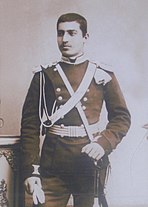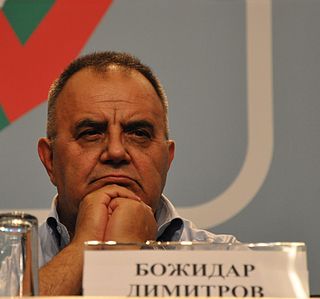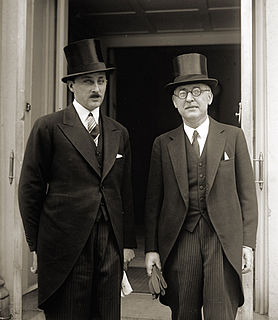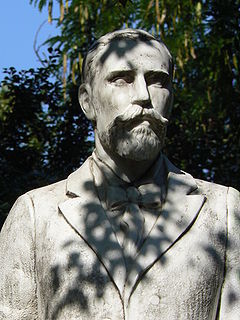 W
WDimitar Dimitrov Agura was a Bulgarian historian, one of the first professors of history at Sofia University and a rector of the university.
 W
WAsen Chilingirov Ph.D. is born in 1932 in Sofia. He is a Bulgarian art historian and culturologist.
 W
WPetar Bogdan Bakshev or Petar Bogdan ; was an archbishop of the Roman Catholic Church in Bulgary, historian and a key Bulgarian National Revival figure. Petar Bogdan restored the Catholic hierarchy and was one of the organizers of a Bulgarian uprising of the region of Chiprovtsi against the Ottoman rule. He is most famous for being the author of the first Bulgarian history.
 W
WConstantine of Preslav was a medieval Bulgarian scholar, writer and translator, one of the most important men of letters working at the Preslav Literary School at the end of the 9th and the beginning of the 10th century. Biographical evidence about his life is scarce but he is believed to have been a disciple of Saint Methodius. After his death in 885, Constantine was jailed by the Germanic clergy in Great Moravia and sold as slave in Venice. After a successful escape to Constantinople, he came to Bulgaria around 886 and started working at the Preslav Literary School.
 W
WPetar Georgiev Darvingov was a Bulgarian officer, revolutionary and military historian, corresponding member of Bulgarian Academy of Sciences from 1932.
 W
WBozhidar Dimitrov Stoyanov was a Bulgarian historian, politician, and polemicist in the sphere of Medieval Bulgarian history, the Ottoman rule of Bulgaria and the Macedonian Question. He was director of the National Historical Museum, formerly a Bulgarian Socialist Party member, and later became affiliated with the Citizens for European Development of Bulgaria (GERB) political party.
 W
WMarin Stoyanov Drinov; Bulgarian: Марин Стоянов Дринов; Russian: Марин Степанович Дринов was a Bulgarian historian and philologist from the National Revival period who lived and worked in Russia through most of his life. He was one of the originators of Bulgarian historiography. Drinov was a founding member of the Bulgarian Academy of Sciences, as well as its first chairman.
 W
WEusebius Fermendžin was an Austro-Hungarian high-ranking Roman Catholic cleric, Franciscan friar and academic of Banat Bulgarian origin.
 W
WBogdan Dimitrov Filov was a Bulgarian archaeologist, art historian and politician. He was Prime Minister of Bulgaria during World War II. During his tenure, Bulgaria became the seventh nation to join the Axis Powers.
 W
WAlexander Fol was a Bulgarian historian and Thracologist. In 1957, he studied history at the University of St. Kliment Ohridski in Sofia and earned a PhD in 1966. He worked as a university lecturer from 1972 and became a professor in 1975. From 1980 to 1986, he served as Minister of Culture and Education of Republic of Bulgaria. His research interests lay in classical Greek and Roman history, the cultural history of southeast Europe and Asia Minor, and Indo-European studies. He is best known for his contributions to Thracology.
 W
WSergei Simeonov Ignatov is a Bulgarian Egyptologist and politician, minister of education, youth and science from November 2009 to 28 January 2013.
 W
WKrasimir Donchev Karakachanov is a Bulgarian politician. He is currently the leader of the IMRO – Bulgarian National Movement and Minister of Defence.
 W
WGavril Iliev Katsarov was a Bulgarian historian, classical philologist and archeologist. Rector of Sofia University. Director of the National Archaeological Museum and the Bulgarian Archeological Institute.
 W
WLyubomir Miletich was a leading Bulgarian linguist, ethnographer, dialectologist and historian, as well as the chairman of the Bulgarian Academy of Sciences from 1926 to his death.
 W
WProfessor Nikola Iliev Milev (1881–1925) was a Bulgarian historian, publicist, public figure, diplomat, and a participant in the Macedonian revolutionary movement.
 W
WLazar Mladenov was a Bulgarian Orthodox priest and, later, a member of the Bulgarian Uniat Church in the Ottoman Empire and a convert to Eastern Catholicism.
 W
WNikola Dimitrov Nedeva (1886–1970) was a Bulgarian Major general, politician and military historian. He was the Minister of Interior affairs and Public Health in the third and fourth cabinets of Georgi Kyoseivanov.
 W
WPetar Nikolov-Zikov is a Bulgarian political scientist, historian and politician, Associate Professor in New Bulgarian University and Deputy Minister of Education and Science in the third cabinet of Boyko Borissov. He declares himself a conservative and advocate for the "three pillars of conservative politics" – Christianity, patriotism and capitalism. He is also critical of the legal framework of abortion and same-sex marriage.
 W
WSaint Paisius of Hilendar or Paìsiy Hilendàrski (1722–1773) was a Bulgarian clergyman and a key Bulgarian National Revival figure. He is most famous for being the author of Istoriya Slavyanobolgarskaya, the second modern Bulgarian history after the work of Petar Bogdan Bakshev from 1667, "History of Bulgaria". Most Bulgarians are taught that he was the forefather of the Bulgarian National Revival.
 W
WGeorgi Sedefchov Parvanov is a Bulgarian historian and politician who was President of Bulgaria from 2002 to 2012. He was elected after defeating incumbent Petar Stoyanov in the second round of the November 2001 presidential election. He took office on 22 January 2002. He was reelected in a landslide victory in 2006, becoming the first Bulgarian president to serve two terms. Parvanov supported Bulgaria's entry into NATO and the European Union.
 W
WZorka Petrova Parvanova is a Bulgarian historian and former First Lady of Bulgaria from 2002 until 2012. She is the wife of Georgi Parvanov, the former President of Bulgaria.
 W
WSimeon Traychev Radev was a Bulgarian writer, journalist, diplomat and historian, most famous for his three-volume book The Builders of Modern Bulgaria.
 W
WAnastas Spasov Razboynikov was a Bulgarian revolutionary and teacher, a worker of the Internal Macedonian-Adrianople Revolutionary Organization (IMARO).
 W
WHristo Silyanov was a Bulgarian revolutionary, historian and memoirist. He was among the activists of the Bulgarian Macedonian-Adrianople Revolutionary Committees and in his memoirs uniquely described the history of the organization in its early period.
 W
WVáclav Hermenegild Škorpil was a Czech-Bulgarian archaeologist and museum worker credited along with his brother Karel with the establishment of those two disciplines in Bulgaria, as well as a geologist, botanist, architect and librarian.
 W
WKarel Václav Škorpil was a Czech-Bulgarian archaeologist and museum worker credited along with his brother Hermann with the establishment of those two disciplines in Bulgaria.
 W
WIvan Yonchev Snegarov was Bulgarian historian and archivist.
 W
WAleksandar Stoyanov Teodorov-Balan was a Bulgarian linguist, historian and bibliographer.
 W
WTzvetan Todorov was a Bulgarian-French historian, philosopher, structuralist literary critic, sociologist and essayist. He was the author of many books and essays, which have had a significant influence in anthropology, sociology, semiotics, literary theory, intellectual history and culture theory.
 W
WGancho Tsenov (1870-1949) was a Bulgarian scholar who worked mainly in the field of Bulgarian history. He is considered to be the founder of the fringe theory on the autochthonous origin of the Bulgarian people, exhibited for the first time in a comprehensive form in 1910 in his capital work "The Origins of Bulgarians and the Origin of the Bulgarian State and the Bulgarian Church". Professor Gancho Tsenov was translating sources from Bulgarian, German, Latin, Greek, Hebrew, Hungarian, Polish and Russian.
 W
WIvan Yordanov Venedikov was a Bulgarian archaeologist, historian, thracologist and philologist who studied Thracian and medieval history, archaeology, art and culture; Bulgarian cultural and artistic heritage.
 W
WGavril Tanasov Zanetov was a lawyer, historian, publicist and literary critic. He was a close associate and adviser to Prime Minister Vasil Radoslavov.
 W
WVasil Nikolov Zlatarski was a Bulgarian historian-medievalist, archaeologist, and epigraphist.